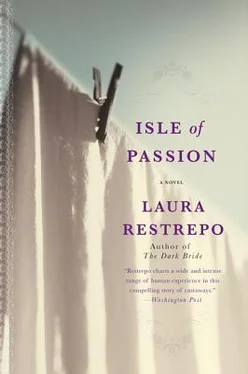Arnaud thought that he was losing his mind; this was the opportunity he had been waiting for, the only opportunity to liberate his people. Afraid that the ship would pass them by, he decided to start out and try to intercept it. They boarded the only boat they had and started out rowing to the limit of their physical strength. He was carrying a long pole with a white flag to make signals.
Nervousness, desperation, hope: all contributed to give the men enough energy to row.
From the tower on the cliff, Alicia, her children, and the rest of the women saw the boat grow distant and silently prayed for success.
“Let them be seen, O Lord! Let them be seen! […]
Impossible.
It was written.
That day, October 5, 1916, was a fatal day . […]
Those who were watching saw with anguish and desperation that the boat had stopped and that there was a struggle on board.
A big black mass had taken hold of the boat, and the men were furiously trying to hit it with their oars.
It was a manta ray!
It all happened in a matter of seconds. The sea monster was more powerful than the weak men and their little boat. It quickly overturned the tiny craft and it sank. The men never came back to the surface. […]
The sea was calm as if nothing had happened. The ship’s silhouette, indifferent, continued on its course.*

I COME TO ACAPULCO to find out what happened to Gustav Schultz after he left Clipperton on the gunboat Cleveland , of the U.S. Navy. In a newspaper of 1935, I found the first trace, the thread that would lead me to unravel the story: the German fellow never returned to his native country.
After Captain Arnaud threw him out of the isle, Schultz stayed for the rest of his days, which were many, in the Mexican port of Acapulco. What tied him to a country that, besides being foreign to him, was being torn asunder at the moment by a violent revolution? There was only one thing: a deep, sworn commitment. The one that he had screamed at the Clipperton shore, a few minutes before his departure, to the woman he loved, whom he was being forced to leave behind against his will. With his blond locks prey to the winds and a stormy expression in his madman’s eyes, he had promised Altagracia Quiroz that he would not rest until he could rescue her, that he would marry her and make her happy. And if there was a reason he had remained in Mexico, it was to fulfill his impossible promise.
I have been able to find the address in Acapulco of one of the houses in which he lived. It’s an adobe structure on a large piece of land in the colonial district of La Pocita. I talk to the old local neighbors, those who had heard about him and still remember his name. I ask them if he was insane when he arrived or if he was ever crazy.
“No, not crazy, never,” they answer me. “Mr. Schultz was a great man here in Acapulco. A respected and beloved person, who gave us drinking water here in our port. We owe our first aqueduct to him. Did you already visit the Water House? It is a tourist attraction, but it was his home for years. At first he lived here in this house, but after he brought the water, he moved over there.”
In the Water House one can still see the tanks, the pumps, and the hydraulic equipment that Gustav Schultz brought, installing them himself and making it all work, certainly applying the same meticulous care that he had taken with the Decauville train tracks in Clipperton.
A few years later he became a Mexican citizen and accepted a public office which he served with honesty and Teutonic perseverence: that of the port captain.
“Had he any children?” I ask people.
They say no, but he adopted a newborn Mexican baby from an orphanage, and gave him both his first and family names.
So now I’m looking for Gustavo Schultz, his adoptive son, at the place I am told he works. He is the owner of a poultry business in the Acapulco Central Food Market. The passageways have been recently washed with buckets of water mixed with a disinfectant. I get lost in a labyrinth crowded with all sorts of colors and smells. I pass by the striking piñatas in the shape of stars, ships, bulls. I pass by the mangoes and the custard apples; the fifty-eight varieties of chiles; the images of baby Jesus on a throne, donning crown and mantle; the kiosks of the clothes menders waiting for customers in front of antique sewing machines. I circulate among the ears of corn, the sweet potatoes, and the prickly pears; and in between the tables with benches where one can eat tacos, flautas, and burritos prepared by sweaty fast cooks. I see the huitlacoche and the incredible variety of mushrooms; someone offers me colorfully striped serapes, neck scarves, and hand-embroidered huipiles . They want me to buy paper cutouts, candy skulls, and cempaxuchitl flowers for the dead. Pumpkin flowers to make soup, and Jamaica flowers for agua fresca . I cross through the meat kiosks shouldering past legs of beef and heads of lamb. Until I finally reach the chickens.
They hang by the legs, all in a tight row, ugly and featherless, a hostile look in their dead eyes. There are thousands of chickens in more than two hundred kiosks, with at least one vendor in each kiosk. I go one by one, asking, “Are you Gustavo Schultz, or do you know him?”
“He had a business here, but he died about three years ago. His son, who has the same name, lives in Chilpancingo, state of Guerrero.”
Gustav Schultz, the German fellow, Gustavo Schultz, his son, Gustavo Shultz, his grandson. I search in the Chilpancingo phone book, make a long-distance call, and talk with the last Schultz, the only one still alive. His voice sounds young, and he tells me he’s in politics. He remembers his grandfather as very blond, with a light complexion and bushy eyebrows. He says that neither he nor his father, who are both dark-haired, resembles him physically because they had no blood connection. He confessed not to know any details of the Clipperton drama because the family does not like to recall such a painful past.
He does not have more information, he acknowledges, but in order not to disappoint me, he reads on the phone from a clipping he has kept for years. It is an interview of his grandfather by the journalist Hernán Rosales, published in the Mexico City newspaper El Universal on May 14, 1935. In it Schultz tells more about other people than about himself. His grandson reads with some difficulty because, as he explains, the clipping is now yellowed and faded. On the phone I get the story of the first Gustav Schultz, succinctly told by himself.
He says that in 1904, when he was twenty-four, he embarked in San Francisco, without much thought, for a place he had never heard of, Clipperton Island. He was going there to work for an English phosphate company. When he arrived, the uninhabited and barren isle filled him with melancholy: “I was living there like Robinson Crusoe.” Eager to see and touch something green and alive, he sailed from Clipperton to the island of Socorro in the Revillagigedo Archipelago to bring back thirteen young and tender coconut palms and forty tons of topsoil in which to plant them. As man cannot subsist on coconuts alone, he also imported some company for himself: a young woman, Daría Pinzón, and her only daughter, Jesusa Lacursa.
On his return to Clipperton, he shared his life with that woman, watched the palm trees he planted grow, and made his employees work like slaves. He worked like a beast of burden himself. “I fell in love with my life in that desert seascape,” he says. About his conflicts with Ramón Arnaud and his violent and crazy days, Gustav Schultz chose to keep silent. About the appearance of Altagracia Quiroz in his life, he confesses: “Her presence relieved my great sadness.”
Читать дальше













